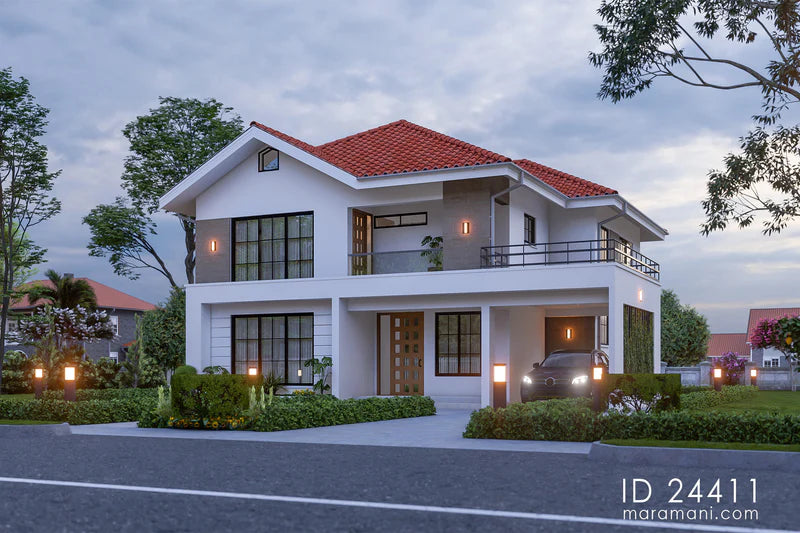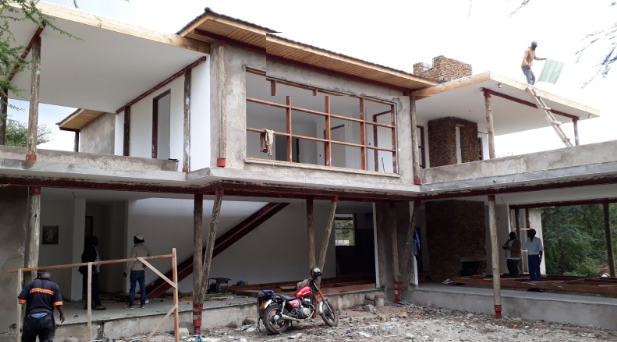African diaspora experience the need to build a house either for themselves or for others. Doing anything remotely is not easy and when it comes to building well… Building a house in the absence can be a daunting challenge. There are so many things that need to be managed and a lot of headaches to be incurred.
Here are a few handy tips that you can consider to help you navigate the process.
Kickstart the process in person

While you may not be able to make frequent visits to the site, it is important to start the process in person. This ensures that you have met all the key stakeholders in person and set the tone for what you expect to be done.
Starting the building project in person will also allow you the opportunity to delegate regular supervision to a trusted and locally available individual. This can ensure that you get regular updates on progress, challenges, and the general welfare of your building project.
This is a form of preparation that can spare you the choice of being forced to trust relatives with the responsibility of supervision without having planned and prepared for it.
While relying on your relatives may not be entirely troublesome, preparing and meeting your local delegate in person increases the likelihood of your vision being realized – whether the person is a relative or not.
Get Regular updates

Ensure you have a way of knowing the progress of your project. This can be achieved in different ways, depending on the people you have on or near the site. Ensure you get daily photos and videos on WhatsApp and other similar platforms.
In this use case scenario, it is wise to create a group with the contractor and other stakeholders. Also, seek updates from independent sources such as family members. You can schedule regular online meetings or calls at least once per week to be even better informed of the progress and status.
Record all your costs

Get a detailed list of what your money will be spent on before sending it for every transaction. Also, record all material costs, transport, labour, licenses and any other costs you put into the project.
Record all the money you send for construction and capture important details such as dates, recipients, the particular purpose, and what means you used to send it. Remember to record as much data as possible.
Ask your contractor to keep all records of expenses. You can use free apps like CashBook where the contractor can record all expenses and take photos of receipts. This way you will have a real-time update of all costs and expenses.
Have one main person in charge
This will ensure you don’t have conflicts and people blaming each other because of lacking clarity. Avoid delegating tasks and work to different contractors. This can result in materials and equipment getting lost or used inadequately. This may also cause conflict of interests during various stages of the construction and in the end, you will be responsible for such a mess.
Prepare to be surprised

When you are abroad, especially for a period of time you adjust to how things work over there and remember that things are done differently back home. You are likely to get surprised at first at how the systems works and the rules being followed, after which you will eventually adapt.
When building back home you have to unlearn what you have experienced abroad and remember that systems don’t work as initially expected. When you are to start the building process, prepare to be surprised.
There are stark differences between building overseas compared to the process of building a house in Africa. The conventions of safety standards, building materials, and the use of machines in construction are drastically different in Africa, so be prepared to make some compromises.
Building Regulations

You will need to confirm whether you require planning permission and building licenses. This is because building regulations differ from one area to another, so check whether your plans and property in question are suitably classified to allow the kind of structure you intend to build.
Local knowledge and expertise

Get in touch with a local architect who can not only help with planning regulations but can also recommend reputable sources of labor, materials, and other logistics needed to satisfy your construction. A local architect will also inform you of emergent challenges with which you may not be familiar, thus saving you some unexpected costs and procedural delays.
A local architect can link you with an experienced and reputable contractor. This is an important consideration, granted that you will have to solicit quotes and estimates for different crews before making the decision you find favorable. Use the prices quoted by different contractors to leverage against others to ensure you don’t pay in excess of the odds for builders’ services.
Building in Africa also carries some complications associated with dealing primarily with cash. If you are building in a remote area or a small town, some hardware suppliers and vendors may not accept wire payments. This is because local crews may not have active bank accounts.
Time management

Be prepared for delays. It is very rare to hear a construction project has been done on time. You will have to leave some room for delays. Construction in Africa is labor-intensive; thus, challenges may arise when you work with contractors, manual laborers, and even architects.
There also could be delays because of the transportation of materials to the construction site. This is a more common problem in rural areas where they might not have a hardware store nearby.
Therefore, you will likely need some patience to get through the process successfully.
Significant Investment
Be sure you have the time, money, and patience to see the project through. Also, assume that the project is going to cost more than what you have projected. Try not to skimp on the architectural plans, and remember that you get what you pay for.
Do your best to use locally available materials. This is a more affordable option compared to imported materials, and local materials are more familiar to the crew that will be working on your house. A locally available delegate or emissary will be invaluable to help in local sourcing.
If you don’t intend to be on or near the site for long periods of time, create an appropriate plan to protect your investment. You need to have some security on-site to protect the materials and structure during non-working hours.
Be aware of language barriers

Local architects, builders, and other stakeholders likely to be involved in building your house are likely to be fluent in the main local language. This is particularly significant if you intend to build in an area where the main language is not English or another language with which you are not comfortable or fluent.
Skip the troubles
Alternatively, you can enlist the services of a reputable housing agency that can build you the house of your choice on a chosen parcel of land. Using a well-known and experienced scheme will help you steer clear of being forced to rely on unreliable and unpredictable delegates and relatives. This can be additionally beneficial if you can find a housing agency that allows you to make a deposit and gradual installments as the project continues.
There is a high likelihood that you have friends who have built property in Africa using a housing agency. You can ask them for recommendations to find an agency that is good and affordable.
In a nutshell
The list of dos and don’ts is virtually endless when trying to gap the bridge between being abroad and building a house in Africa. There are a lot of moving parts to the process and you should be prepared to adjust when the need strikes.






Leave a comment
This site is protected by hCaptcha and the hCaptcha Privacy Policy and Terms of Service apply.